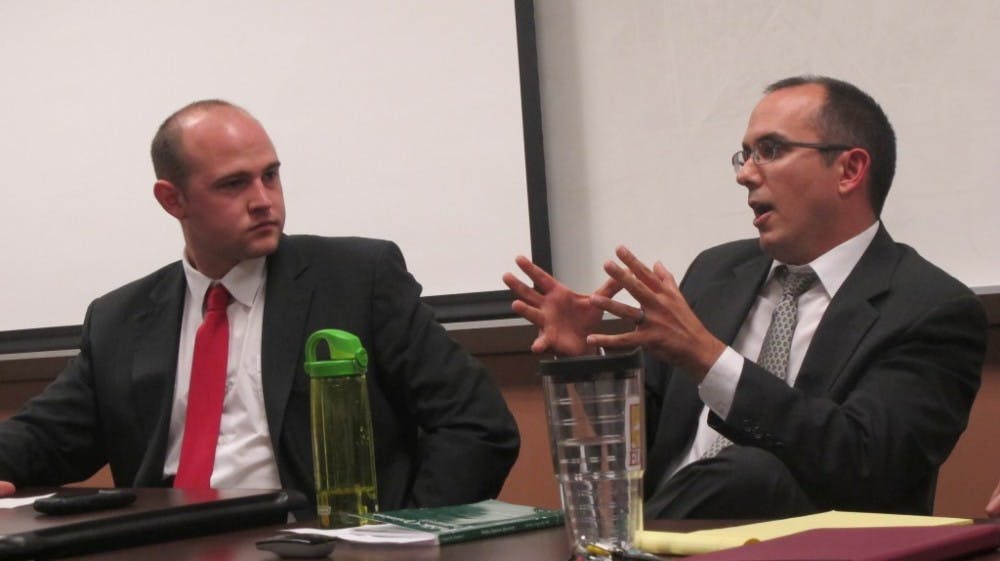The polarization of American government has left the confines of Congress and taken to the streets, Jason Husser, assistant professor of political science at Elon University and assistant director of the Elon Poll, said in a panel discussion in Lindner Hall Oct. 8.
“You don’t see a lot of hardcore republicans choosing to move to Berkeley, Calif., the same way you don’t see very liberal people moving to Birmingham, Ala.,” Husser said. “We increasingly see same party households. That means they have same party children.”
According to a recent CNN poll, congressional approval ratings are at an all-time low of 10 percent, largely due to public perceptions of political polarization. But, Husser said, some level of polarization is necessary for the vitality of a two-party system.
“In 2012, you didn’t really have to worry about much that Mitt Romney and Barack Obama were going to have different policies,” he said. “In times of depolarization it can be very difficult to know what a candidate stands for. And we’ve probably seen increases in voter turnout due to polarization.”
The current government shutdown was precluded by competing budget resolutions passed separately by the House and Senate last spring. Differences are usually hashed out in committee meetings between the two legislative bodies, but this time negotiations never took place.
[quote] We’ve really already reached the debt ceiling." - Carrie Eaves, assistant professor of political science [/quote]
Without a budget increase, the U.S. federal government will run out of money to pay its bills on Oct. 17, according to Carrie Eaves, assistant professor of political science.
“We’ve really already reached the debt ceiling,” Eaves said. “There’s not a hard deadline, but pretty quickly we would run out of money, beginning on Oct. 17.”
Kenneth Fernandez, assistant professor of political science and director of the Elon Poll, pointed out the difficulty of making changes within the federal government due to the constitutional provisions for checks and balances between branches.
“When someone really wants to change things, it’s not easy to do,” Fernandez said. “You have to get through the House. You have to get through the Senate. You have to get through the Supreme Court. That means we have a lot of political stability, no matter what party takes power.”
People tend to form opinions of members of Congress based on their voting record on national issues, Eaves said, but the constituents who they rely on for re-election tie sometimes legislators’ hands.
“What seems irrational to us is a calculated move and decision on their part,” Eaves said. “It might not be what’s best for the nation as a whole, but we know who turns out to vote in primaries: very loyal partisans, those people who are much more extreme. To win primaries, politicians must cater to their base.”
[quote] I have hope because you’re in this room. You see problems of civic engagement, you’re the solution to it. You personally as Elon students have the ability to change that. Don’t forget it.” - Jason Husser, assistant professor of political science [/quote]
The debt crisis and government shutdown may actually increase civic engagement, Fernandez suggested.
“There can be opportunities for dialogue here,” he said. “It can be painful. People can be unsatisfied with outcomes, but it brings the issues to the forefront so people have to deal with it. I think this crisis can peak interest. It makes us think about our appreciation of our right to vote. I’m optimistic that these crises, these conflicts in the long run can create more engaged citizens.”
In the meantime, education may be the answer, according to senior Greg Zitelli. He said people on social media have griped that members of Congress shouldn’t be paid during the shutdown, but the 27th Amendment prevents any pay raises or docks within Congress from occurring until the next term.
“It frustrates me, because I know that most people just don’t understand that’s not something they can prevent,” Zitelli said. “It’s another little thing that people are very negative on and confused about with Congress.”
In closing, Husser asked who would vote for a President Leo Lambert/Jon Stewart ticket, to laughs and dozens of raised hands from the crowd. But the students in the room made Husser optimistic about the future.
“I have hope because you’re in this room,” he said. “You see problems of civic engagement, you’re the solution to it. You personally as Elon students have the ability to change that. Don’t forget it.”


